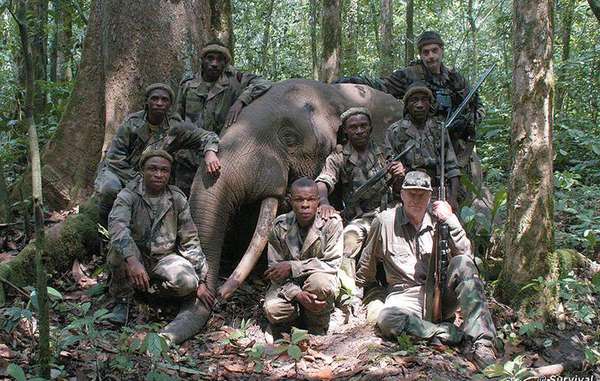
by Deep Green Resistance News Service | Nov 2, 2016 | Biodiversity & Habitat Destruction, Colonialism & Conquest
Featured image: World Wildlife Fund trustee Peter Flack with dead forest elephant. © Survival International
by Survival International
Survival International has learned that an elephant-hunting safari operation jointly owned by a French billionaire has been implicated in human rights abuses against local Baka “Pygmies” and their neighbors, including illegal evictions and torture.
The operation is based in two “protected areas” in Cameroon, leased by Benjamin de Rothschild. It offers tourists the chance to pay €55,000 to shoot a forest elephant.
Baka were evicted from their ancestral land to create the trophy hunting operation, contrary to international law. It is patrolled by soldiers, police and armed guards, and Baka have now been told they will be shot on sight if they cross it to hunt to feed their families, gather plants, or visit religious sites.
The Baka report that three of their forest camps have been burnt by wildlife guards and safari camp employees in the last year alone. Baka men hunting for food in this forest have been beaten by local police, soldiers and wildlife guards.

Benjamin de Rothschild, joint owner of a luxury elephant-hunting operation on Baka land
© JeuneAfrique
One Baka man told Survival: ”They told me to carry my father on my back. I started walking, [the guard] beat me, he beat my father. For three hours, every time I cried out they would beat me, until I fainted and fell to the ground with my father.”
Another Baka man said: “When the trophy-hunting company finds us here they burn the camps. They beat us, they search for us, they set their dogs on you, their guns on you.”
A third Baka said: “The trophy-hunting company said that if they see anyone [in the forest] bullets will fly. Now those who have family there have gone to get them out. How will we live now?”
Survival contacted Mr. de Rothschild informing him of reports of serious human rights abuses having been committed to maintain the trophy-hunting operation, but has received no reply.
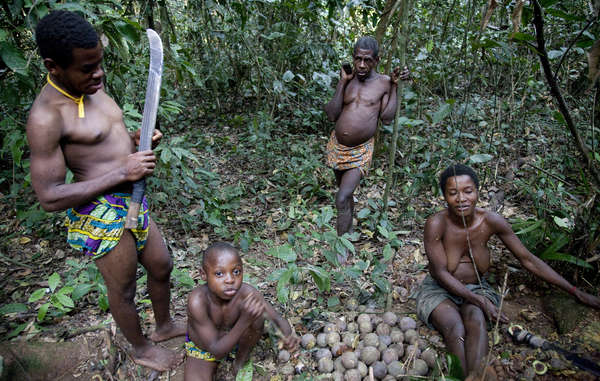
The Worldwide Fund for Nature (WWF) is very active in Cameroon, and the trophy-hunting “protected areas” form part of one of their key “conservation landscapes.” WWF has yet to comment on the allegations, or say whether it proposes to take any action.
One booking operator told Survival that: “All our luxurious fully equipped forest camps are solid construction, air conditioned with private chalets with full bathrooms and dressing parlors. Delicious multi-course cuisine is served with top shelf European wines and beverages… Our newest forest camp has a large screened in swimming pool.”
Watch: Baka plead for forest guards to leave them in peace.
© Survival International
Across the region, Baka “Pygmies” and their neighbors are being evicted from their ancestral homelands and face arrest and beatings, torture and even death while big game trophy-hunting is encouraged. WWF trustee Peter Flack has also hunted elephants in the region.
Survival’s Director Stephen Corry said: “Across Africa, rich trophy hunters are welcomed into the same areas where tribal hunters are illegally evicted from their ancestral homelands and brutalized for hunting to feed their families. This has to stop. Conservation in the Congo Basin is land theft, a continuation of colonialism. It leads to widespread and horrific human rights violations, including extrajudicial killing. Why are so few people speaking out? Survival is leading the fight against these abuses. Conservationists must respect human rights like everyone else is supposed to.”
Click here to find out more and take action.
This is not an isolated incident. Across Africa, tribal people are accused of “poaching” because they hunt to feed their families. And they face arrest and beatings, torture and death, while big game trophy hunters are encouraged. Survival International is leading the fight against these abuses.
Note: “Pygmy” is an umbrella term commonly used to refer to the hunter-gatherer peoples of the Congo Basin and elsewhere in Central Africa. The word is considered pejorative and avoided by some tribespeople, but used by others as a convenient and easily recognized way of describing themselves.
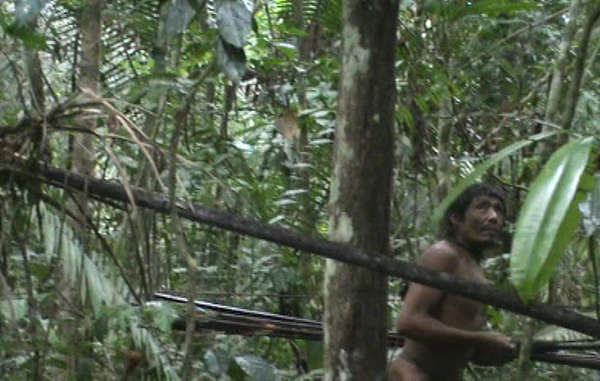
by Deep Green Resistance News Service | Oct 28, 2016 | Colonialism & Conquest
by Survival International
Waves of loggers are invading the territory of one of the most vulnerable peoples on the planet. The Indians, known as the Last of the Kawahiva, are the survivors of a larger tribe who have been killed or died of disease.
One group of loggers was recently caught by agents from FUNAI, Brazil’s Indigenous Affairs department. However, as the loggers have local political support, and FUNAI agents do not have the power to arrest suspects, the men were released. Further waves of loggers have since entered the territory.
The crisis has raised concerns among campaigners that the tribe and their rainforest home could be destroyed entirely.
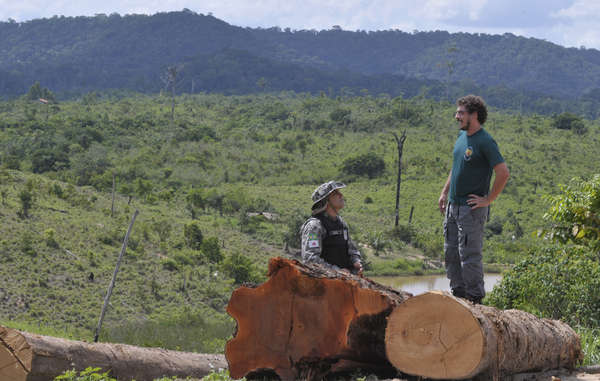
FUNAI agents work in many parts of Brazil to protect indigenous territories from loggers and other threats. © Mário Vilela/FUNAI
In April 2016, the Brazilian Minister of Justice signed a decree to create a protected indigenous territory on the tribe’s land to keep loggers and other intruders out. This was a big step forward for the Kawahiva’s lands and lives, and followed pressure from Survival’s supporters around the world. However, the decree has yet to be properly enacted and now the small team who are working to protect the land are facing severe budget cuts.
Jair Candor, an experienced FUNAI agent, said: ”The Kawahiva are trapped. If any contact happens, it will be devastating for them. The only way to ensure their survival is to map out the land and put in place a permanent land protection team. Otherwise, they will be relegated to the history books, just like so many other tribal peoples of this region.”
Oscar-winning actor Mark Rylance has narrated a film to highlight the tribe’s plight.
Survival’s Director Stephen Corry said: “Brazil committed to protecting the Kawahiva’s land in April, but with the government dragging its heels an urgent and horrific humanitarian crisis is unfolding. The Kawahiva’s land is still being invaded and their forest is still being destroyed. It’s time for Brazil to take action as it promised, before the genocide of an entire people is complete.”
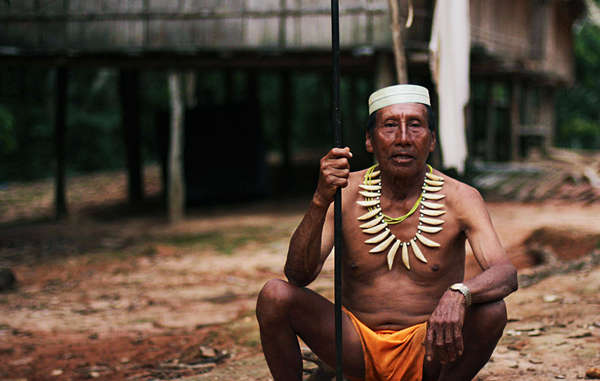
by Deep Green Resistance News Service | Oct 6, 2016 | Mining & Drilling
Featured image: Many contacted Matsés have expressed opposition to any efforts to contact their uncontacted neighbors, or to explore for oil in their territory. © Survival International
by Survival International
Survival International has learned that the Peruvian government is developing a “Master Plan” for a new national park that could pave the way for large-scale oil exploration. This will threaten the lives and lands of several uncontacted tribes.
The area, known in Spanish as the Sierra del Divisor [“Watershed Mountains”], is part of the Amazon Uncontacted Frontier, the region straddling the Peru-Brazil border that is home to the largest concentration of uncontacted tribal peoples on the planet.
A new plan for the area currently being drafted by Peru’s national parks agency SERNANP could enable oil companies to enter the park. It has further been reported that the new government wants to change the law to make it even easier to open up national parks to oil and gas operations.
The Sierra del Divisor National Park was created in 2015 to protect the region. The new plan could wipe out the uncontacted Indians, not all of whom have been recognized by the authorities.
A contacted Matsés woman said: “Oil will destroy the place where our rivers are born. What will happen to the fish? What will the animals drink?”
In 2016, Canadian oil company Pacific E&P cancelled a contract to explore for oil on nearby contacted Matsés territory, in the face of stiff opposition from the tribe.

The Watershed Mountains are a unique and highly diverse environment, home to many uncontacted tribal peoples.
© Diego Perez
However, it still has a contract to explore in the Watershed Mountains.
In 2012, it conducted the first phase of exploration, which Survival International and contacted Matsés campaigned against.
The more vulnerable uncontacted members of the tribe are still at risk, and not in a position to consent or object to the project. The environment that they have depended on and managed for millennia could be destroyed.
The oil exploration process uses thousands of underground explosions along hundreds of tracks cut into the forest to determine the location of oil deposits.
Uncontacted tribes are the most vulnerable peoples on the planet. All uncontacted tribal peoples face catastrophe unless their land is protected.
With a new Peruvian government in place, Survival and the indigenous organizations AIDESEP, ORPIO and ORAU are urging the government to think again.
Survival’s Director Stephen Corry said: “It’s in all our interests to fight for the land rights of uncontacted tribes, because evidence proves that tribal territories are the best barrier to deforestation. Survival is doing everything we can to secure their land for them.”
by Deep Green Resistance News Service | Sep 18, 2016 | Colonialism & Conquest
Featured image: Members of the Paraguayan Ayoreo-Totobiegosode group on the day they were contacted for the first time, in 2004. © GAT/Survival
by Survival International
The Paraguayan government has failed to act to protect a group of uncontacted tribal people, despite having been ordered to do so in February of this year.
Six months ago the Inter-American Commission on Human Rights demanded that the government stop the deforestation of the Chaco, which suffers the highest rate of deforestation in the world, and protect the vulnerable uncontacted Ayoreo Indians who live there.
However, the government has failed to stop the continuing clearance of the area’s forest, raising concerns that the uncontacted Ayoreo Indians face annihilation.
Several major ranching corporations are clearing forest to raise cattle in the Chaco, which is losing an average of 14 million trees per month. Deforestation continues and bulldozers have recently been heard on Ayoreo land.
Local organizations GAT and OPIT have been trying to persuade the government to act on the Commission’s demands but the government has so far done very little.
One Ayoreo told Survival: “We don’t want to lose our land. It’s where our fathers and grandparents lived and where our relatives live now. We want our children and grandchildren to grow up in the land of our ancestors. We are claiming this land.’’

Much of the Ayoreo Totobiegosode land is being deforested, Paraguay.
© GAT/Survival
Companies destroying the Chaco include Carlos Casado S.A. (a subsidiary of Spanish construction company Grupo San José), River Plate S.A, and Yaguarete Porá S.A, a Brazilian beef company. Yaguarete previously received Survival International’s “Greenwashing of the year” award for trying to brand an area it had heavily deforested as a “nature reserve.”
Evidence proves that tribal territories are the best barrier to deforestation and therefore the best way to protect the Chaco is to uphold the Ayoreo’s land rights. Uncontacted tribes are also the best guardians of their environment. Their knowledge is irreplaceable and has been developed over thousands of years.
In August 2016, the UN examined Paraguay’s performance on racial discrimination. Survival International submitted a report on Paraguay’s human rights violations against the Ayoreo, which was considered in the session.
Survival’s Director Stephen Corry said: “Unless Paraguay takes rapid action, the Ayoreo will become another statistic in the ongoing genocide of South America’s uncontacted peoples. The situation couldn’t be more serious: the Ayoreo face catastrophe unless their land and forest is protected from these rapacious foreign companies.”
Read more about the Ayoreo and their homeland here.
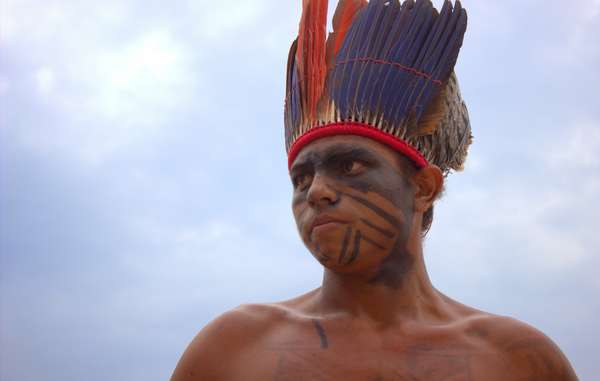
by Deep Green Resistance News Service | Aug 8, 2016 | Indigenous Autonomy
Featured image: On the eve of the Rio Olympics, Brazil has blocked a dam which would have destroyed forest of the Munduruku tribe © Maíra Irigaray/Amazon Watch
By Survival International
As the Rio Olympics kick off, Brazil has blocked the construction of a controversial dam in the heart of the Amazon rainforest.
The São Luiz dam, planned for the Tapajós river, threatened to flood the Munduruku Indians’ forest and force many off their land.
The Munduruku, like all indigenous peoples, depend on their land for their survival, but industrialized society is trying to steal it and plunder its resources in the name of “progress” and “civilization.” The Munduruku have been firmly opposing the São Luiz dam, and dozens of others planned for the region.
The dam’s environmental licence was shelved this week following the Munduruku’s resistance, pressure from public prosecutors and experts on the ground, and reports by Brazil’s Indigenous Affairs Department and Environment Ministry.
Alongside their struggle to stop the dams, the Munduruku have embarked on a landmark mission to map out their ancestral territory and protect it from illegal miners and loggers. The Brazilian government has failed to uphold its constitutional duty to do this, leaving the land open to destruction.
Munduruku leader Suberanino Saw said, “Our struggle is dangerous, but we know we will win.”
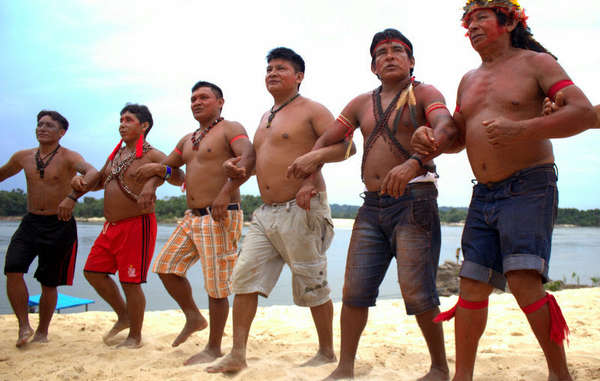
The Munduruku Indians have been firmly protesting a series of dams on the Tapajós river. © Maíra Irigaray/Amazon Watch
Tribal peoples are the best conservationists and guardians of the natural world.
Together with tribes across Brazil, the Munduruku are also protesting plans to change the law and drastically weaken indigenous peoples’ land rights. One of these plans, known as “PEC 215,” would give anti-Indian landowners and others the chance to block the recognition of new indigenous territories – and it might even enable them to break up existing ones.
Survival’s “Stop Brazil’s Genocide” campaign, launched in April 2016 for the run-up to the Olympics, is galvanizing global support for the Indians’ resistance against PEC 215, and calling for the protection of the land of uncontacted tribes, the most vulnerable peoples on the planet.










